It’s one of the biggest mysteries in all of seafood — what does octopus actually taste like?
Surrounded by an air of mystery, somewhere between anecdotal accounts, rumors and secondhand stories lies the true flavor profile.
In this comprehensive guide, we’ll dive deep into the culinary world of octopus and determine conclusively once that age-old question is answered: what does octopus taste like?
From personal tasting experiences to expert tips from top chefs, read on for everything you need to know about cooking up succulent seafood dishes featuring your favorite tentacled invertebrates!
What is Octopus?

Octopus refers to a sea creature with eight arms and a distinct head, found in the oceans worldwide.
It belongs to the cephalopod family, which also includes squids and cuttlefish.
Octopuses come in various sizes, with some being as small as an inch and others reaching up to 30 feet long.
They are intelligent creatures that possess advanced nervous systems capable of intricate behaviors such as solving puzzles, opening containers, and camouflaging themselves.
Octopuses have become widely recognized for their impressive survival skills that allow them to adapt well to different environments.
Interestingly, these creatures are invertebrates, meaning they lack bones or cartilage in their bodies but feature a complex muscular system that enables them to move rapidly both in and out of water.
What Does Octopus Taste Like?
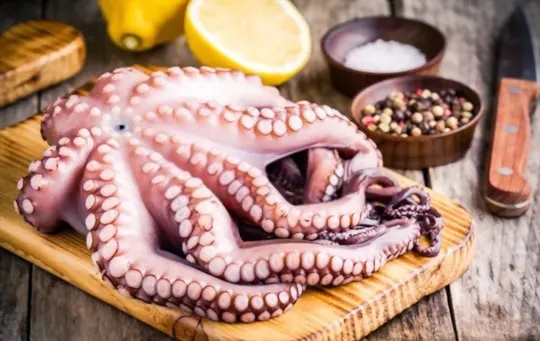
Octopus is a delicacy that can be found in many coastal regions around the world.
If you have never tasted octopus before, you may be wondering what it tastes like.
The flavor of octopus can vary depending on how it is prepared, but generally speaking, it has a mild and slightly sweet taste.
When cooked properly, octopus has a tender and chewy texture that is similar to squid or cuttlefish.
Some people describe the texture as being similar to chicken or pork, while others say it is more like fish.
Regardless of your personal preference, octopus is considered a nutritious and healthy food option that is low in fat and high in protein.
If you are looking to try octopus for the first time, there are several ways to prepare it that will allow you to fully experience its unique flavor and texture.
One popular way to cook octopus is by grilling or frying it with garlic and lemon juice for added flavor.
Another option is to slow-cook the octopus in liquid until it becomes tender and flavorful.
Overall, the taste of octopus can be described as mild and slightly sweet with a chewy texture similar to squid or cuttlefish.
Whether you are an adventurous eater or simply looking for something new to try, adding some octopus dishes into your diet could be a fun and exciting culinary adventure.
Factors that Affect the Taste of Octopus
The taste of octopus can vary based on a number of factors.
The texture and flavor depend on how it is cooked, where it is sourced from, and its age.
Some crucial factors that affect its taste are freshness, cooking time, and seasoning.
Freshness plays an important role in the taste of octopus.
If the octopus has been frozen for too long, it can develop a fishy taste which can ruin the dish.
It is best to use fresh or properly thawed octopus for optimal taste.
Cooking time also affects the flavor and texture of octopus.
Overcooking can result in a rubbery and chewy texture while undercooking may lead to a slimy texture.
Thus, proper cooking techniques are essential to ensure the best taste possible.
Seasoning also contributes significantly to the final taste of the dish.
Seasoning with salt and pepper can draw out natural flavors from the octopus while adding other spices such as paprika or chili powder can add depth to the dish.
Overall, these factors play a significant role in shaping the taste and quality of dishes featuring octopus.
Next up, we will explore different techniques on how to cook octopus to enhance its flavor.
How to Cook Octopus to Enhance its Flavor?
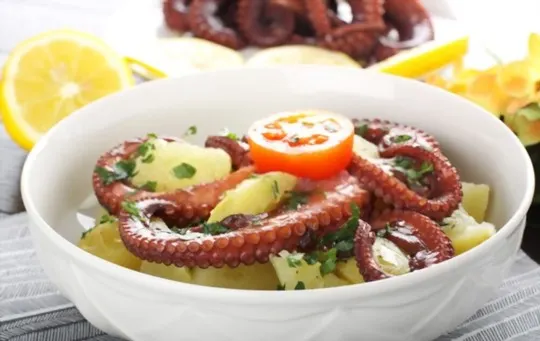
To enhance the flavor of octopus, there are a few important steps to take when cooking this seafood delicacy.
Follow these four easy steps for an unforgettable dish:
- Prepare the octopus: Begin by cleaning and rinsing the octopus thoroughly to remove any residual sand or debris. Remove the head from the body, as well as the beak, eyes and viscera. Cut off any remaining tentacles at their base.
- Tenderize the flesh: Octopus can be quite tough if not prepared properly, so it’s important to tenderize it before cooking. Place the cleaned octopus in a pot with plenty of salt and boil for approximately 45 minutes or until soft.
- Grill or pan-fry for extra flavor: Once tenderized, brush the octopus with olive oil and either grill it on a barbecue or pan-fry it in a skillet over high heat. This will add a delicious charred flavor to each bite.
- Add seasoning: While grilling or frying, sprinkle salt, pepper and other seasonings such as garlic powder or paprika over each piece of octopus to further enhance its flavor.
By following these simple steps when cooking octopus, you’ll bring out its natural flavors and create an unforgettable meal.
As you continue your culinary exploration with octopus, it’s important to experiment with different preparation methods until you find your perfect match.
Octopus can be enjoyed in many different ways from sashimi-style raw dishes to crispy fried bites – its versatility makes it an ideal ingredient for many recipes.
Culinary Uses of Octopus
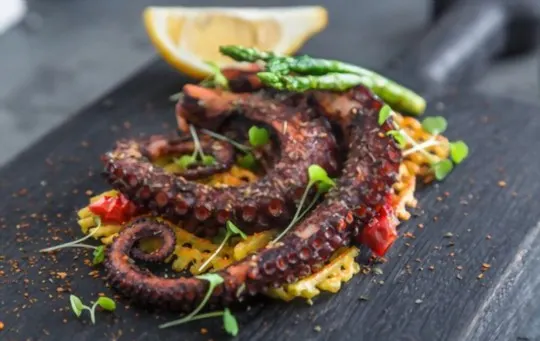
Octopus is a versatile seafood that is used in various culinary dishes around the world.
When cooked correctly, octopus can have a tender and meaty texture with a slightly sweet and briny flavor.
In this section, we will discuss the diverse culinary uses of octopus.
Let’s take a look at some common ways to prepare and serve octopus for consumption:
- Grilled Octopus: This is one of the most popular ways to serve octopus. It is often marinated with garlic, lemon juice, olive oil and paprika to add extra flavour. It is then grilled over high heat to create charred edges and smoky flavours.
- Fried Octopus: Another classic way to eat octopus is the crispy fried version, which requires dipping it into batter made from eggs or flour before deep frying it until golden.
- Stewed or Braised Octopus: In this method, the octopus is slow-cooked with onion, tomato, wine or vinegar for an extended period of time. The finished product has tender meat that picks up aromatic flavors from its braising liquid.
- Carpaccio-style Octopus: By slicing raw octopus thinly and serving it chilled with olive oil, lemon juice and sea salt you create a visually appealing dish with vibrant colors.
Octopuses are also used in soups including traditional Greek dishes like revithada (chickpea stew), Italian seafood soups such as cioppino or bouillabaisse.
Now that we have gone through some delicious ways to use Octopus in your dishes let’s move on to its nutritional benefits.
Is Octopus Healthy?
Octopus is a nutritious seafood option that can provide an array of health benefits.
It is low in fat, high in protein, and packed with vitamins and minerals such as vitamin B12, iron, and zinc.
Additionally, octopus contains taurine which has been linked to numerous health benefits including improved cardiovascular health.
To further understand the nutritional value of octopus, let’s take a look at some of the key components that make it a healthy food choice.
In addition to being low in calories and fat, octopus is also rich in protein and important minerals like iron and zinc.
Vitamin B12 found in octopus aids in producing red blood cells and maintaining proper brain function.
Furthermore, octopus is also recognized for its anti-inflammatory properties which help reduce inflammation levels throughout the body.
This characteristic can be contributed to chondroitin sulfate found within octopus meat.
It is essential to note that while consuming cooked or grilled octopus can benefit your body; raw or undercooked seafood holds risks that may lead to food poisoning or bacterial infections.
Therefore it’s vital to handle this seafood with care when cooking.
In summary, Octopus is an excellent seafood option if you’re looking for healthy food options as it delivers valuable nutrients which contribute towards improving heart health and overall immunity.
Where to Buy Octopus and How to Store It?
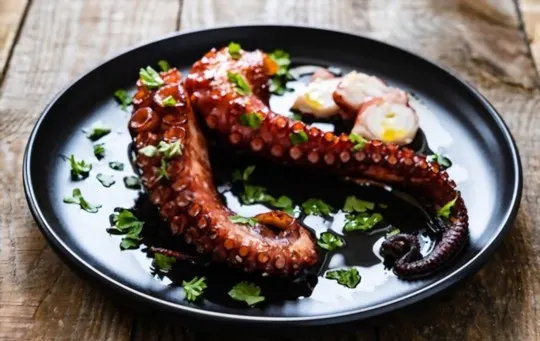
To answer the question “Where to Buy Octopus and How to Store It?”, octopuses can be found in most seafood markets, fish stores, or at your local supermarket.
You can also order them online from various websites that specialize in seafood.
Once you have bought your fresh or frozen octopus, it’s important to know how to store it properly.
- Before storing it in the refrigerator or freezer, make sure it is properly cleaned and gutted. If you’re starting with a whole octopus, rinse it thoroughly under cold running water and remove any remaining entrails. Then cut off the head and tentacles and remove the beak.
- To store fresh octopus in the refrigerator, wrap it in plastic wrap or put it in an airtight container and place it on a bed of ice packs. This will help maintain its freshness for up to three days.
- If you want to store your octopus for longer than three days, consider freezing it. Before freezing, blanching the octopus can help preserve its flavor better. Put the cleaned tentacles into boiling saltwater for around one minute before immediately transferring them into ice-cold water for about ten minutes to stop cooking. Afterward, place them in a resealable freezer bag or plastic wrap. When properly stored in the freezer this way, it can last up to six months.
Conclusion
Cooking techniques such as grilling, poaching or sous-vide are popular methods to prepare octopus, depending on one’s taste preference.
When cooked correctly, octopus tastes succulent and tender with a subtle briny flavor that varies among different species.
In summary, if you’re looking to expand your culinary horizons and try something new, consider buying some fresh or frozen octopus at your local seafood market or online retailer.
With proper cooking techniques and an open mind, you might just discover a new favorite dish.
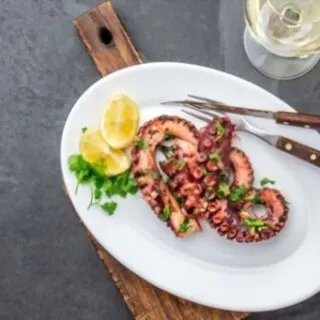
What Does Octopus Taste Like? A Comprehensive Guide
Ingredients
- Octopus
- Ingredients from your selected recipes
Instructions
- Select ingredients that work well together.
- Use a recipe or method that will enhance their natural taste.
- Taste and adjust the recipe as needed to achieve the desired flavor.

Carrie is a food writer and editor with more than 15 years of experience. She has worked for some of the biggest names in the food industry, including Bon Appétit, Food & Wine, and Martha Stewart Living.
As the Editor in Chief of IntroChicago.com, Carrie oversees all of the content on the site. She also manages the team of contributing writers and editors, who help to create delicious recipes, helpful tips, and informative articles that you’ll find on the site.
A native of the Chicago area, Carrie is passionate about all things food. She loves trying new restaurants and experimenting with new recipes in her kitchen. She’s also a graduate of the Culinary Institute of America, so she knows a thing or two about food!
